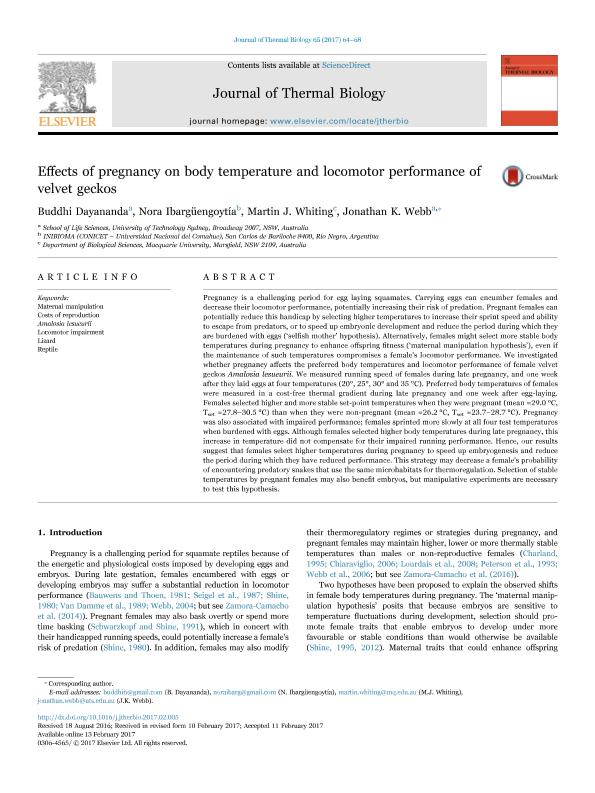Mostrar el registro sencillo del ítem
dc.contributor.author
Dayananda, Buddhi
dc.contributor.author
Ibarguengoytía, Nora

dc.contributor.author
Whiting, Martin J.
dc.contributor.author
Webb, Jonathan K.
dc.date.available
2018-10-31T20:01:14Z
dc.date.issued
2017-04
dc.identifier.citation
Dayananda, Buddhi; Ibarguengoytía, Nora; Whiting, Martin J.; Webb, Jonathan K.; Effects of pregnancy on body temperature and locomotor performance of velvet geckos; Pergamon-Elsevier Science Ltd; Journal of Thermal Biology; 65; 4-2017; 64-68
dc.identifier.issn
0306-4565
dc.identifier.uri
http://hdl.handle.net/11336/63407
dc.description.abstract
Pregnancy is a challenging period for egg laying squamates. Carrying eggs can encumber females and decrease their locomotor performance, potentially increasing their risk of predation. Pregnant females can potentially reduce this handicap by selecting higher temperatures to increase their sprint speed and ability to escape from predators, or to speed up embryonic development and reduce the period during which they are burdened with eggs (‘selfish mother’ hypothesis). Alternatively, females might select more stable body temperatures during pregnancy to enhance offspring fitness (‘maternal manipulation hypothesis’), even if the maintenance of such temperatures compromises a female's locomotor performance. We investigated whether pregnancy affects the preferred body temperatures and locomotor performance of female velvet geckos Amalosia lesueurii. We measured running speed of females during late pregnancy, and one week after they laid eggs at four temperatures (20°, 25°, 30° and 35 °C). Preferred body temperatures of females were measured in a cost-free thermal gradient during late pregnancy and one week after egg-laying. Females selected higher and more stable set-point temperatures when they were pregnant (mean =29.0 °C, Tset =27.8–30.5 °C) than when they were non-pregnant (mean =26.2 °C, Tset =23.7–28.7 °C). Pregnancy was also associated with impaired performance; females sprinted more slowly at all four test temperatures when burdened with eggs. Although females selected higher body temperatures during late pregnancy, this increase in temperature did not compensate for their impaired running performance. Hence, our results suggest that females select higher temperatures during pregnancy to speed up embryogenesis and reduce the period during which they have reduced performance. This strategy may decrease a female's probability of encountering predatory snakes that use the same microhabitats for thermoregulation. Selection of stable temperatures by pregnant females may also benefit embryos, but manipulative experiments are necessary to test this hypothesis.
dc.format
application/pdf
dc.language.iso
eng
dc.publisher
Pergamon-Elsevier Science Ltd

dc.rights
info:eu-repo/semantics/openAccess
dc.rights.uri
https://creativecommons.org/licenses/by-nc-nd/2.5/ar/
dc.subject
Amalosia Lesueurii
dc.subject
Costs of Reproduction
dc.subject
Lizard
dc.subject
Locomotor Impairment
dc.subject
Maternal Manipulation
dc.subject
Reptile
dc.subject.classification
Otras Ciencias Biológicas

dc.subject.classification
Ciencias Biológicas

dc.subject.classification
CIENCIAS NATURALES Y EXACTAS

dc.title
Effects of pregnancy on body temperature and locomotor performance of velvet geckos
dc.type
info:eu-repo/semantics/article
dc.type
info:ar-repo/semantics/artículo
dc.type
info:eu-repo/semantics/publishedVersion
dc.date.updated
2018-10-23T16:15:42Z
dc.journal.volume
65
dc.journal.pagination
64-68
dc.journal.pais
Países Bajos

dc.journal.ciudad
Amsterdam
dc.description.fil
Fil: Dayananda, Buddhi. University of Technology Sydney; Australia
dc.description.fil
Fil: Ibarguengoytía, Nora. Consejo Nacional de Investigaciones Científicas y Técnicas. Centro Científico Tecnológico Conicet - Patagonia Norte. Instituto de Investigaciones en Biodiversidad y Medioambiente. Universidad Nacional del Comahue. Centro Regional Universidad Bariloche. Instituto de Investigaciones en Biodiversidad y Medioambiente; Argentina
dc.description.fil
Fil: Whiting, Martin J.. Macquarie University; Australia
dc.description.fil
Fil: Webb, Jonathan K.. University of Technology Sydney; Australia
dc.journal.title
Journal of Thermal Biology

dc.relation.alternativeid
info:eu-repo/semantics/altIdentifier/url/http://www.sciencedirect.com/science/article/pii/S0306456516302534
dc.relation.alternativeid
info:eu-repo/semantics/altIdentifier/doi/http://dx.doi.org/10.1016/j.jtherbio.2017.02.005
Archivos asociados
